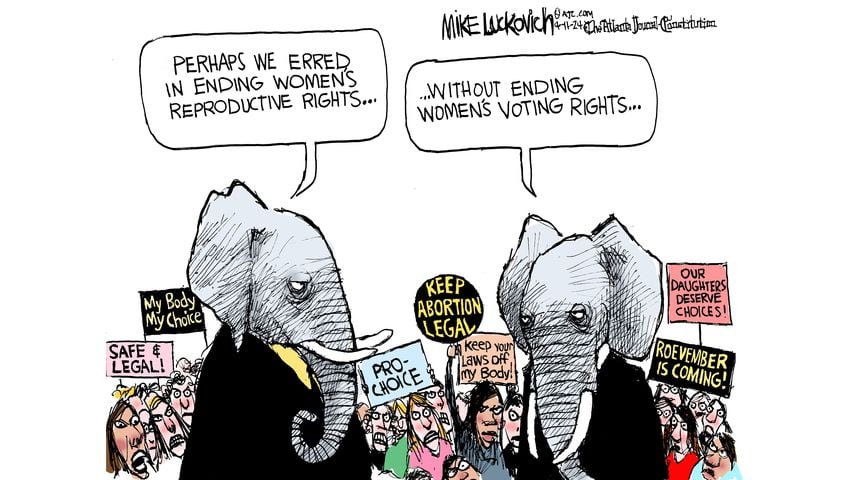No Sift next week. The next new posts will appear on May 13.
If someone with those kinds of powers, the most powerful person in the world, with the greatest amount of authority, could go into office knowing that there would be no potential penalty for committing crimes, I’m trying to understand what the disincentive is from turning the Oval Office into the seat of criminal activity in this country. … If the potential for criminal liability is taken off the table, wouldn’t there be a significant risk that future presidents would be emboldened to commit crimes with abandon while they’re in office?
– Justice Ketanji Brown Jackson during the discussion of presidential immunity
This week’s featured posts are “The Manhattan case against Trump is stronger than I expected“, “What to make of student protests?“, and “The Supreme Court is breaking America’s faith in the law“.
This week everybody was talking about student protests

This is the subject of a featured post.
After I pushed the button on that piece, I noticed this tweet by GOP opinion-shaper Frank Luntz:
Last night at the [White House Correspondents] dinner, I spoke privately with 4 members of Congress: 2 Dems and 2 GOPers. All 4 are big foreign policy players and all 4 are strongly pro-Israel in every way. However… All 4 spoke with significant and serious concern (bordering on anger) about Israel’s impact on humanitarian aid in Gaza. None of them called for a ceasefire, but all of them were deeply critical of what they believe is Israel’s interference and lack of cooperation in getting aid to the Palestinian people. For more than a decade, some Israeli leaders dismissed what was happening on college campuses. They were wrong then, and they would be wrong now to dismiss this warning about what’s happening in Congress.
and Trump’s trial
This is covered in another featured post. I’ll include here some details that didn’t fit into that article.

The trial has given Trump many things to complain about, from the courtroom being cold to the judge’s gag order that takes away “my constitutional rights to speak“, i.e. fairly ineffectively preventing him from trying to intimidate witnesses and jurors.
His weirdest complaint, though, was that the trial prevented him from being with his wife Melania on her birthday Friday. The court proceedings ended for the day at 4:30, so there was plenty of time for the Trumps to have a night on the town, if only Melania had decided to leave their Florida home and come to their Trump Tower apartment to support her husband during his trial. But clearly it is Judge Merchan’s cruelty and not Melania’s indifference that is keeping them apart.

Another reality-denying Trump complaint is that his supporters are being kept away from the trial. He posted:
Thousands of people were turned away from the Courthouse in Lower Manhattan by steel stanchions and police, literally blocks from the tiny side door from where I enter and leave.
None of that is true. In fact, MAGA supporters have almost unanimously ignored his pleas for them to act out. More than a year ago, Trump predicted “potential death and destruction” if he were charged in this case. Again and again, he has warned that the American people would not stand for any attempt to put him on trial, and has done his best to incite January 6 style violence. But it hasn’t worked. Every day, a mere handful of docile Trump supporters show up outside the courthouse.
and the Supreme Court

People who believe in our legal system generally found Thursday’s discussion of Trump’s “absolute immunity” claim not just annoying or enraging, but depressing. Our highest court is corrupt. There’s just no getting around that any more. I discuss why in the third featured post.
One aside, concerning several cases discussed this week: The arguments underline a basic difference between how liberals and conservatives think: Liberals are more grounded in reality. Again and again, the liberal justices referenced things that are actually happening, while the conservative justices were far more interested in imagining scenarios that could happen, but are highly unlikely.
I’ve made this observation before, with respect to guns.
If you’ve ever wandered into an argument over guns and gun control, you’ve undoubtedly noticed that the two sides talk past each other. Proponents of gun control quote statistics: how many more shooting deaths we have in America than there are in countries with fewer guns, how many more suicides or police deaths there are in well-armed states, and so on.
Pro-gun advocates are more likely to tell stories, and often those stories are dark what-if fantasies: What if home invaders came to kill you, kidnap your baby, or rape your teen-age daughter? What if you were a hostage in a bank robbery? What if you were at a restaurant or grocery store when terrorists broke in and started killing people? Wouldn’t you wish you had a gun then?
Such stories are easily stretched to indict even the mildest forms of gun control, like limiting magazines to ten shots: Picture your wife hiding in a closet with a handgun. Before she hid, she already gotten off a few shots at the invaders, and now she’s not sure how many shots she has left. Don’t you wish now you’d been able to buy her a gun with a larger magazine?
In the featured post on the Court, I described how Alito, Gorsuch, and Kavanaugh wanted to discuss just about every possibility other than the one in front of them, where a grand jury has found probable cause to charge Trump with crimes.
Something similar happened in the Court’s discussion of how the federal EMTALA law conflicted with Idaho’s abortion law. Conservative justices wanted to talk about bizarre hypotheticals in which deceitful women could lie about their suicidal impulses in order to get late-term abortions. Liberals wanted to talk about actual cases in which women with problem pregnancies have to wait until they are near death to get care.
You can see it across the board: Men might claim to be women to get into your daughter’s bathroom. Has that ever happened? Well, maybe not, but it could. Librarians could be grooming your children for pedophilia. Can you name one? Transwomen might drive “real” women out of women’s sports. Well, we just saw the NCAA basketball tournament. Is that happening? On and on.
and new indictments in Arizona
This week Arizona indicted a number of people involved in the Trump fake-elector plot, including all the electors themselves, Mark Meadows, Rudy Giuliani, and a few other Trump administration insiders.
and you also might be interested in …
Harvey Weinstein’s rape conviction was overturned by the New York court of appeals, on the grounds that the trial judge allowed the jury to hear too much about crimes that weren’t directly related. The state has the option to try him again, and in the meantime New York can send him to California, where he faces a 16-year sentence.
It’s a tricky point of the law, which comes up again in the current Trump trial: You’re supposed to be on trial for the specific crime in the indictment, and not for being a bad person in general. But if other crimes indicate a pattern of behavior, they might be relevant. So a judge has to decide: How does the illustrative value of a defendant’s previous bad behavior balance against the possibility of prejudicing the jury against him?
Texas Senator Ted Cruz may have thought his arrangement with iHeart Media circumvented both Senate rules banning outside jobs and election laws preventing candidates from coordinating with or directly raising money for their super PACs. But he may have gotten a little too clever.
Here’s the arrangement: Cruz hosts a three-episodes-a-week podcast, which would be a full-time job for a lot of people. He does it “for free” in the sense that he does not get direct payments from iHeart, which carries the podcast and sells advertising on it. However, iHeart does make regular payments to Cruz’ super PAC, which so far have totaled at least $630K and constitute more than a third of the PAC’s total contributions.
It’s undeniable that this violates the intention of the laws regulating super PACs. But it’s possible Cruz has found an unethical loophole in the law. No one can say for sure at the moment, because Cruz and iHeart refuse to reveal the exact terms of their agreement.
One line of the Texas Observer article on this strikes me as hilarious:
Cruz claims he does the podcast as a service to the public by pulling back the curtain on corruption in Washington.
I can’t argue with him there.
BTW, you might wonder how Cruz’ podcast differs from a Substack blog I often quote: Quick Update by Rep. Jeff Jackson (D-NC). The difference is that Jackson’s blog generates no revenue: subscriptions are free and there are no ads.
President Biden at the White House Correspondents’ Dinner:
The 2024 election is in full swing, and yes, age is an issue. I’m a grown man running against a six-year-old.
I don’t know what to make of South Dakota Governor Kristi Noem’s account of killing her 14-month-old dog Cricket. She tells the story in her new book No Going Back, which isn’t out yet. The Guardian, which got an advance copy, summarizes:
She includes her story about the ill-fated Cricket, she says, to illustrate her willingness, in politics as well as in South Dakota life, to do anything “difficult, messy and ugly” if it simply needs to be done.
Maybe this is where the Republican Party is these days. In 2022, many GOP candidates carried or shot guns in their ads. So maybe the next step is to show you’re not afraid to kill. Or maybe Noem is sending a message specifically to Trump, who is said to be considering her as a possible VP candidate: Mike Pence wasn’t willing to betray the Republic for you, but I’ll do whatever ugly things need doing. (And Trump famously hates dogs.)
and let’s close with something ominous
I suspect I’m not the only one who sees himself Tom Gauld’s “To Be Read” cartoon.












